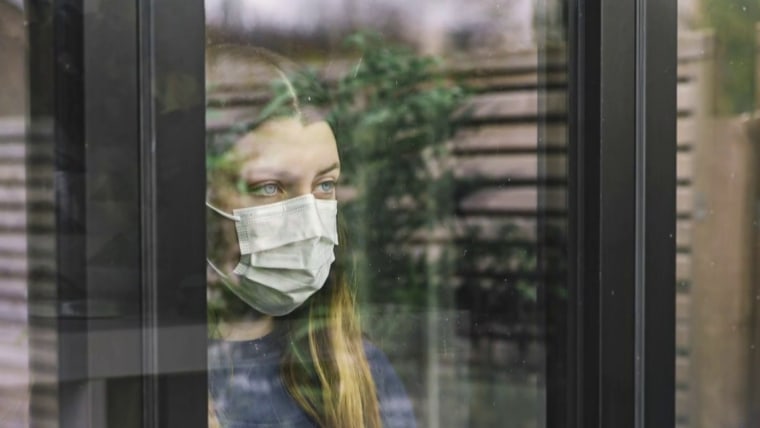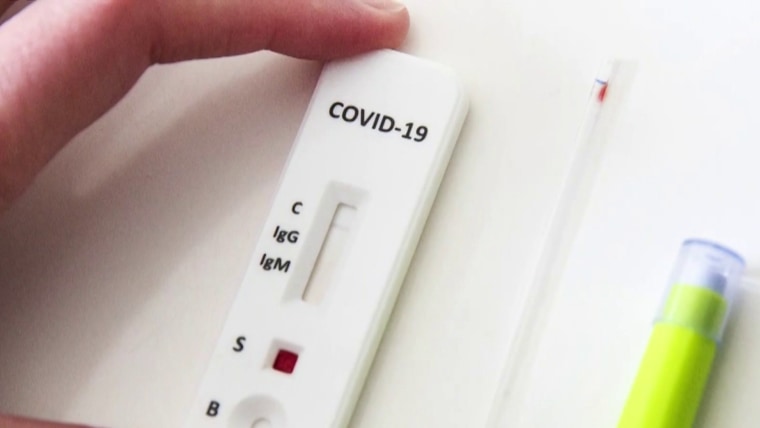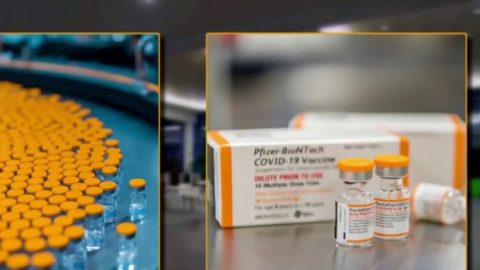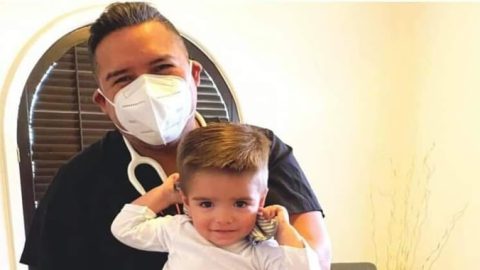The dizzying speed of omicron’s spread has left Americans questioning much of what they know about Covid-19.
Though much remains uncertain, experts are beginning to understand more about the variant and how it affects people who are vaccinated, unvaccinated or who have had a Covid infection. For example, people who are exposed to omicron appear to get sick faster and may have symptoms that are different than those of other variants.
What are the symptoms of omicron?
Early evidence suggests that for most people, at least those who are up to date on their Covid vaccines, omicron appears to cause milder illness that can resemble the common cold, another form of the coronavirus.
For full coverage of the coronavirus pandemic
Dr. Katherine Poehling, an infectious disease specialist and vaccinologist at Atrium Health Wake Forest Baptist in North Carolina, said that these appear to be the prominent symptoms from omicron:
- Cough
- Fatigue or tiredness
- Congestion and runny nose
- Sore throat
- Headache
“We’re seeing a lot of sore throat, runny nose, fatigue and mild headache,” said Dr. Rahul Sharma, the emergency physician-in-chief at the NewYork-Presbyterian/Weill Cornell Medical Center.
Unlike in previous variants, the loss of taste and smell seems to be uncommon, doctors say.
But Poehling, who is also a member of the Advisory Committee on Immunization Practices, which helps guide the Centers for Disease Control and Prevention’s decisions on vaccines, and others stress that those symptoms are based on early reports of omicron cases, not scientific studies.
“Anecdotal reports represent just one person,” said Dr. Bruce Y. Lee, a professor of health policy and management at the City University of New York School of Public Health. “We have to take them with a grain of salt.”
What’s more, they may only reflect certain segments of the population: young and otherwise healthy, as well as those who are fully vaccinated.
“It is clear that if you’re vaccinated, particularly if you’ve had a booster, omicron tends to produce milder infections,” said Dr. William Schaffner, an infectious disease expert at the Vanderbilt University Medical Center in Nashville, Tennessee.
“What we haven’t seen yet is a substantial body of information about what omicron will do in unvaccinated people,” he added.
Indeed, at least one person who was not vaccinated is reported to have died of omicron. Officials in Houston announced in December that the unvaccinated man in his 50s succumbed to the virus.
For people who have been vaccinated, but have not had a booster, typical symptoms include more coughing, more fever and more fatigue than those who have received an extra dose, said Dr. Craig Spencer, director of global health in emergency medicine at New York-Presbyterian/Columbia University Medical Center.
Does omicron cause less severe illness?
There is also emerging evidence that omicron tends not to burrow deep into the lungs as much as previous variants. A study, which was posted online by the University of Hong Kong and not yet peer-reviewed, found that while omicron is less severe in the lungs, it can replicate faster higher up in the respiratory tract.
In this way, omicron may act more like bronchitis than pneumonia, said Dr. Hugh Cassiere, director of critical care services for Sandra Atlas Bass Heart Hospital at the North Shore University Hospital, on Long Island, New York.
“Usually patients with acute bronchitis tend not to be short of breath. They tend to cough and produce sputum,” he said. “Patients with pneumonia tend to be short of breath and feel more fatigued than bronchitis in general.”
A small study from the CDC found that people who had Covid and are later reinfected with omicron may experience fewer symptoms than they did during their initial bout with the virus.
Still, it’s virtually impossible for people to rely on symptoms to self-diagnose an illness. In addition to omicron, the delta variant continues to circulate, along with increasing cases of the flu.
For these reasons, doctors urge people who have any cold symptoms or flulike symptoms to get tested.
How quickly do omicron symptoms start?
According to early data, the time it takes for an infected person to develop symptoms after an exposure may be shorter for omicron than for previous variants — from a full week down to as little as three days or less.
While much more research is needed, it makes scientific sense that a highly contagious virus like the omicron variant would have a shorter incubation period. Its goal, after all, is to infect as many people as possible, as quickly as possible.
“That’s why the spread is occurring at a much faster pace,” said Dr. Anita Gupta, an anesthesiologist and critical care physician at the Johns Hopkins School of Medicine. She added that it’s possible the incubation period could be shorter or longer depending on a number of variables, including age, underlying health problems and vaccination status. “There is no hard and fast rule here.”
How long do symptoms last?
Symptoms appear to last three to five days for most patients, said Sharma.
“A lot of these patients are not having the symptoms for the 10 to 12 days that I saw when there were no vaccinations,” he said. He noted that, in general, symptoms appear to be shorter and milder in the vaccinated compared to the unvaccinated.
For the vaccinated, emergency room or hospital stays are also typically shorter.
“What I can tell you is that patients that are unvaccinated are definitely our sicker patients,” Sharma said. “Those are the patients that are more likely to go to the ICU. Those are the patients that are more likely to be admitted to the hospital.”
Dr. Ryan Maves, an infectious diseases and critical care physician at the Wake Forest School of Medicine in North Carolina, agreed, saying the overwhelming majority of Covid patients he sees in the ICU are unvaccinated.
When should I get tested for Covid?
Given the potential for a shorter incubation period, Vanderbilt’s Schaffner advised that anyone who has been in contact with an infected individual get tested about 72 hours following the exposure.
“If you’ve been exposed and now you’re asking yourself, ‘When should I get tested?’ I think you would best wait at least three days to see if you’ve turned positive,” he said.
For the millions of people without any known Covid exposure, but who are getting together with friends and family, Schaffner said, it would be prudent to get a rapid test the day of the gathering.
Dr. Anthony Fauci, chief medical adviser to President Joe Biden, agreed.
“By all means, go the extra step, go the extra mile to get tested” to alleviate any concerns about gatherings, he said on NBC’s “TODAY” show last month.
Could omicron lead to long Covid?
Though much remains unknown about omicron, experts say the variant could lead to long Covid, even with a mild case.
Patients with long-term symptoms can experience crushing fatigue, irregular heart rhythms and other issues months after their initial Covid infection. This occurred during the first wave of the pandemic, and has continued to lead to long Covid issues through the delta wave.
“We should assume that this variant can do the same thing that previous variants have until proven otherwise,” Lee, of CUNY, said.
Previous research, however, suggests that vaccination can greatly reduce the risk for long Covid.
How worried should I be about omicron?
The omicron variant accounts for about 95 percent of U.S. samples and the delta variant makes up the rest, according to recent CDC projections.
Since omicron has hit almost every area of the U.S., “the question is, how much disease will it cause?” said Dr. Michael Saag, an infectious disease expert and associate dean for global health at the University of Alabama at Birmingham.
Experts continue to urge people to get vaccinated and get a booster shot to reduce the risk of severe illness.
Follow NBC HEALTH on Twitter & Facebook.











Recent Comments